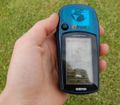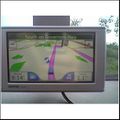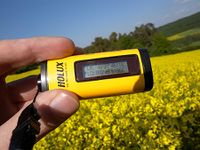GPS receivers
I expect someone to take up the cause and flesh out this page with information on the features, advantages and disadvantages of various GPS (or more widely/generically, GNSS) receivers, but for now, I'm collecting pictures. Please add any different kinds (or better shots of the same kind) or details on these. (see also: osmwiki:GPS device reviews)
Contents
Have a Look
Garmin
Garmin eTrex (hiking)
Garmin eTrex legend (hiking)
Garmin eTrex Vista
Garmin eTrex Vista HCx
Garmin foretrex 101 (running)
Garmin iQue
Magellan GPS
Other GPS
Blackberry (PDA)
Description: The Holux M-241 is a GPS logger and thus its primary use is to log many many trackpoints, not to find places (but that works, too). In contrast to other GPS loggers, it has a small (128x32 pixel) LCD screen and shows: Remaining memory for trackpoints; time; LAT and LON in dd° mm' ss.ss" format; current heading / speed / height; distance from start. It can save more than 100 000 trackpoints, each consisting of LAT, LON, height, time and (with newest firmware version) speed. The M-241 saves trackpoints either by time (every 1/5/10/15/30/60/120 seconds) or by distance (every 50/100/150/300/500/1000 metres or feet). Connection to a computer can be done by bluetooth or USB. This device looks like a yellow film canister (Those of you who still have memories from the analog camera era will know what that is. Sorry kids...) and is NOT water proof. One AA rechargeable battery lasts for 10-12 hours. It has a MTK chipset and a good accuracy.
Opinion (Danatar): I use the Holux M-241 as a secondary GPSr for those times when my other GPSr is out of batteries and to log the track a second time. It even worked on a commercial airplane, but only directly next to the window. It failed me once, when during one week of vacation it only logged one single position per track; Erasing the memory fixed that.
Aviation & Nautical




































